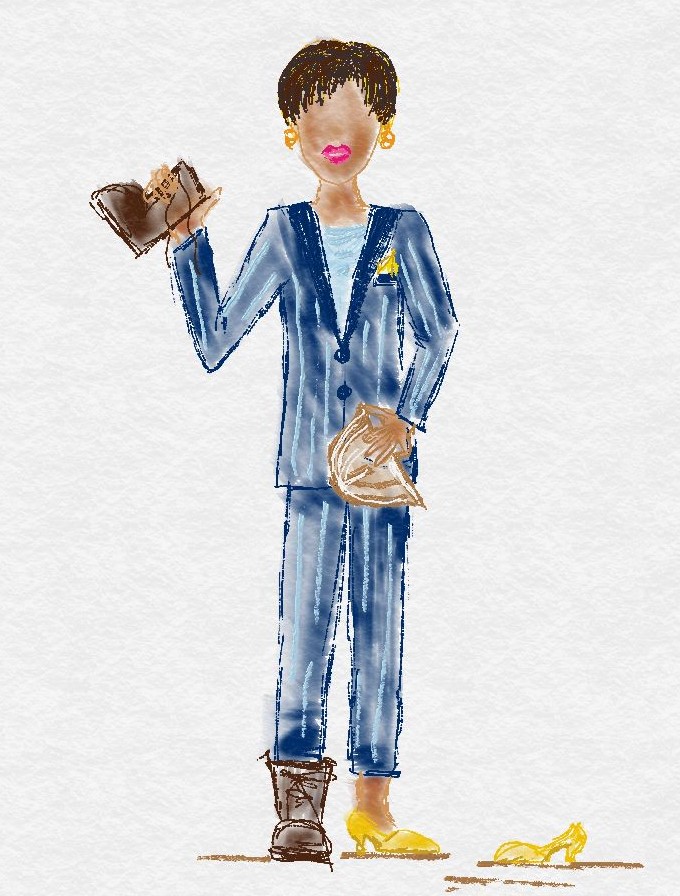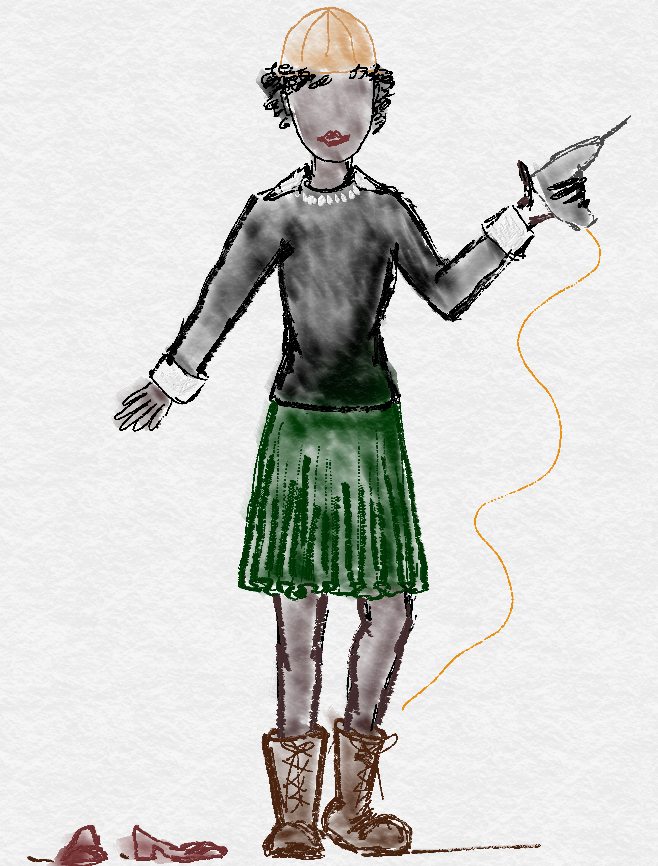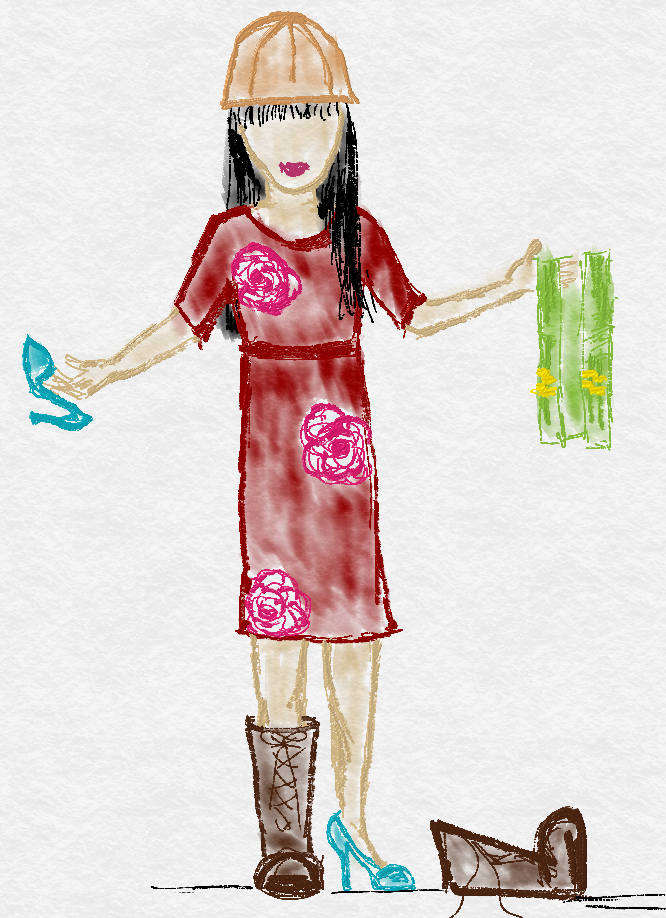Time’s Up II
Part II – Us

Previously we addressed the unsuitable behavior of some men in the workplace, and we offered guidelines for those men who were either sincerely or disingenuously unable to tell the difference between appropriate and inappropriate actions. The other variable in the equation that adds up to a happy workplace is our behavior. Yes, us, the women who are the subjects of this stramash. We may be the victims, but that does not mean we don’t have certain responsibilities in moving toward a solution to the problem.
Wait, what? Somehow the wrong attitudes and actions of other people create responsibilities for us? But we didn’t do anything. Why should we have to work to take care of a problem caused by someone else?
We have a responsibility here because this isn’t Candyland. This is real life, and we live in a world that has been evolving for about 4.54 billion years, give or take 10 to 50 million years. Every ice age, every extinction, every social change, every shift in hemlines has been a product of interdependent factors in a complex environment. You can sit on your princess throne and say that men should just change and life should just be fair. Good luck with that.
For our part, it will only help our cause if we are proactive and do everything in our power to stop the bad guys and enlighten the good guys. Sure, you could just sit around and be mad, waiting for social change to sweep across professional society like a special effect in a science fiction movie. Your desired results will take much, much longer that way, and you will be disconnected from the end result. Instead, we can all take some basic steps to help create an environment that is fair and beneficial to all of us.
1. Repeat after me, “Not all men are bad.” (Okay, you get a pass on this if some guy just broke up with you on a Post-It and you’re out drinking with your girlfriends). It’s funny, because even most guys I know will say, “Men are pigs.” The implication is that men are led around by their baser instincts and, therefore, will always be low quality humans who make bad decisions. But that’s just not true. Even from a statistical standpoint, it is highly unlikely that 49% of 7 billion people would ALL have sub-par character. And assuming that all men are bad is a negative attitude that will ill prepare you for helping your co-workers and bosses and clients evolve into more enlightened colleagues. Saying that all men are bad is a defeatist attitude that will not move us forward even an inch (or a centimeter for our Canadian and European readers).
2. We have to be aware of our own behavior and how it affects the perception of the men around us. I will admit that I sometimes have difficulties with this. I am a toucher – if you’ve met me, I’ve probably hugged you. I routinely grasp the nearest person’s arm to make a point, and I’ll squeeze a colleague around the shoulders to offer congratulations. I have learned that this sometimes generates confusion with my male colleagues. Yes, I’m proud of you for getting that journal article published, but no, I don’t intend to sleep with you as an attaboy. Unfortunately, many men will admit that they are less than adept at reading subtle signs and differentiating between behavior types in various situations. Simply put, some guys think you must want to sleep with them because you squeezed their arms. They are not pigs, they’re just…clueless. It has taken me awhile, but I have learned that I need to be more restrained in many situations to avoid confusion. It doesn’t mean I have to be cold and unfriendly, I just have to pay more attention to men’s reactions and err on the safe side until I feel like I know someone well. This doesn’t mean I’m being unduly burdened, it just means I’m being a responsible adult.
It goes without saying that flirting on the job will broadcast the idea that you might be receptive to inappropriate actions. Certainly, no means no. But you can avoid the pothole more easily if you don’t steer the car in that direction.
3. We have to speak up every time. Sometimes we endure an ugly situation and we emerge unscathed. The temptation is to let well enough alone and move on. Say your boss got physical with you, you gave him what-for, and now he’s acting respectful and giving you a wide berth. You consider just chalking it up to a bad memory and never speaking of it again. But what about the next woman? Maybe she’s not as brave as you are. Maybe she has four kids at home and she’s petrified she’ll lose her job. So the boss just moves on to harassing her. When she finally gets up the nerve to blow the whistle, the supporting evidence you have that would have helped her establish a pattern of behavior isn’t there. Management doubts her claim, because they usually do at first, and when you finally come forward, HR says, “If this really happened, why didn’t you complain?” When you say that the issue was solved, people inevitably look at the other woman and say, “Why didn’t you just do what she did?” Everyone becomes distracted from the fact that what the guy has been doing is WRONG. We need to address bad behavior every time.
It should be noted that at some point in time your justifiable whistle blowing most likely will result in an accusation that you’re just a whiner. You’re too sensitive. You caused the problem. Or, my favorite, you’re just hard to work with. Almost every woman in our field over the age of 30 has been told this at some point because she made public some guy’s bad behavior. I wish I could say don’t worry about it, it won’t happen. But it will, so you have to tell yourself in advance that you’re doing the right thing, and you’re a delightful person. No one can make you feel bad about yourself if you don’t let them.
4. We must always use our power for good. On the opposite side of justifiable whistle blowing is using sexual harassment as a tool to get back at a man with whom you have a personal dispute. Just like sexual harassment, false accusations are wrong. Ruining a man’s reputation because you don’t like him is wrong. Claiming sexual wrongdoing when a workplace romance goes horribly awry is wrong.
I once worked with a woman who actively pursued one of the engineers with the company, even seducing him at his desk after hours. When the short-lived affair went south, she got angry with the engineer and went to the boss to say that she was offended that Playboy magazines were kept in the men’s restroom by this engineer. She felt sexually harassed by this. Obviously, her campaign was personal, and I didn’t back her up when the boss asked me if I also felt compromised. She was furious with me, but I told her that her claim would make it difficult the next time a real problem happened.
This list is not comprehensive, because the best defense is a great offense. But probably our biggest responsibility in our very complicated campaign to rid the workplace of sexual inequalities is our need to support our sisters. This does not mean you have to agree with every opinion of every woman you know, and we don’t all have to be friends. But when another woman needs support, whether it be help reporting a problem or a sympathetic ear to try to figure out how to deal with a difficult boss, you owe it to YOURSELF to give her whatever she needs. The military doesn’t teach the infantry to stick together just to promote good social skills. Don’t ever leave anyone behind and you won’t get left behind.



4 Responses to Time’s Up II